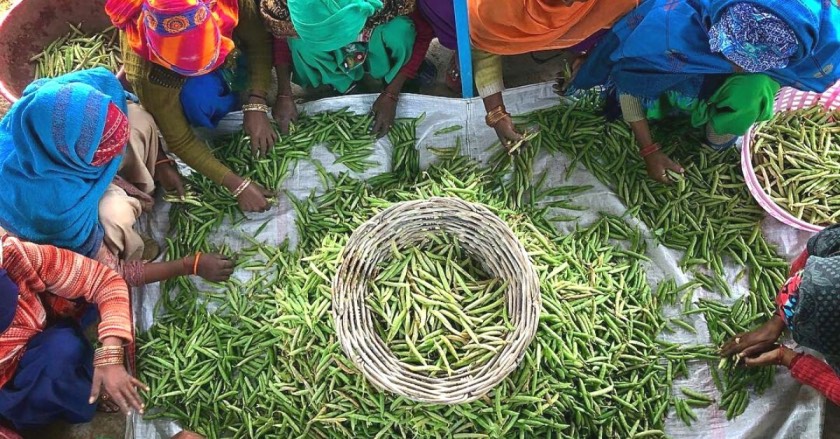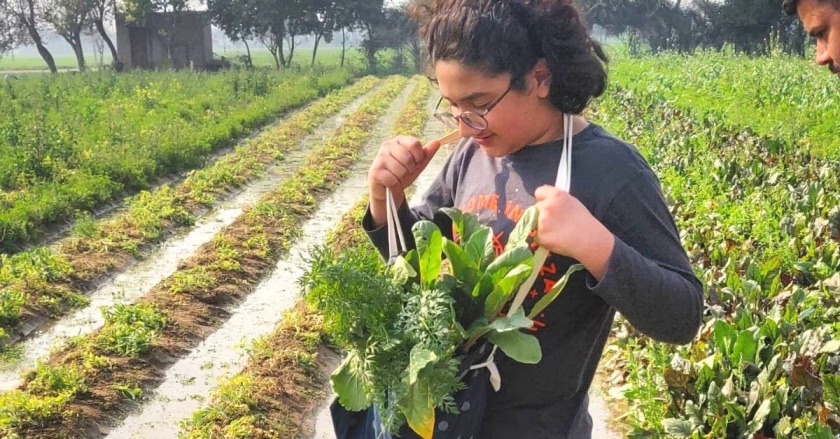The Dabas family belong to Jat Khor, Delhi, and own 28 acres of agricultural land. For years, the family owning the ancestral land limited themselves to using the farm produce to serve the grain and food requirements of their family and relatives. However, an incident in 2009 made the younger generation in the family take a different path.
Mrinal and Lakshay’s grandmother was diagnosed with cancer. Her health condition came as a shock to the family who relied mainly on organic methods of growing vegetables since 2002.
Mrinal says the family learned the importance of healthy food and wanted to push for better and chemical-free food. “Despite her illness, the organic food saved her from undergoing painful chemotherapy. She passed away in February 2018 but we believe that the quality of food helped her survive for so many years,” the 30-year-old tells The Better India.
Despite having graduated in electronics and communication engineering, Mrinal and his brother Lakshay, 27, a post-graduate in environment and development, decided to take the health benefits of organic food to the masses.

“We started working on the mass production of vegetables and grains on the farm. We then increased production of vegetables, wheat, lentils, mustard, rice, millets and fruit crops in 2013,” he says.
The brothers started selling organic food products under the brand — Organic Acre. Currently, they serve around 5,000 families in Delhi, providing fresh produce within 12 hours of the harvest. They also promote agro-tourism to bring urban dwellers closer to farming and understand the importance of organic food. They also conduct workshops to help people and farmers switch to organic. The business earns them Rs 3.5 crore annually.
A systematic approach to farming
Mrinal, who is also the managing director of the company, explains that over the years, the brothers devised a model and crop pattern which ensures a steady harvest and a steady stream of income throughout the year.
“We plant seasonal vegetables and have a systematic method to follow. They are planted in batches and grown in a gap of 15 days. So, when the harvest begins, there is a continuous flow of the produce,” Mrinal says.
Moreover, the plantation also involves using crop rotation techniques to maintain the nutrition levels in the soil. Citing an example, Mrinal says they plant black-eyed peas with corn. “The black-eyed peas consume high amounts of nitrogen from the soil, but the corn releases the same and hence compensates for the surplus utilisation of the nutrition,” he adds.
Explaining the organic agriculture techniques, Mrinal says they only focus on using organic manure and pest control measures. “We spray neem extract with water and emulsifiers on greens and other vegetables,” he says, adding that the vegetable sale alone earns them Rs 4 lakh a month.

Mrinal says that he also processes the crops in the mill set up on the farm. Flours made from pulses and wheat are also sold in the market while the oil and cakes made from mustard extract have a high demand in the industry. The cattle provide milk and desi ghee which adds to their income.
The farm also rears bees and conducts workshops for people who wish to learn about bee-keeping and dive into the honey business.
Mrinal says that a lot of experimentation and planning went behind the success. “We tried multiple ways and methods to understand crop patterns and come up with the agricultural model. We suffered losses but continued to move ahead,” he adds.
He says that apart from growing organic farm produce, marketing and creating linkages became a challenge. “The market for organic produce was at a nascent stage when we started, and it is still growing. We worked to develop a network of buyers. Moreover, we needed to create solutions for the packaging, pricing and other aspects. To solve this problem, we reached out to customers on social media and to customers in Delhi who were willing to buy fresh farm vegetables. We guarantee freshness,” Mrinal says.
He further adds that the customers needed a little persuasion. “We explained how the organic vegetables could benefit their health in the long run,” he says.
He says that transportation was another issue as vegetables had to be kept fresh even during the summer heat when temperatures soared to 45℃.
Teaching the farmers

Once the organic business model was set up, the brothers extended their support to farmers.
Lakshay says the farm organises and conducts workshops, training and live demonstrations for farmers who wish to switch to organic farming. “We handhold the farmers in integrated pest management, conduct soil testing, help them prepare the land, make vermicompost and address their queries. Our courses stretch over weeks to offer internships,” he adds.
He says that farmers are also given lessons on marketing and setting up the linkages. “Many farmers express concerns about a lack of avenues for selling organic produce which deters them from making the switch. They are also not always tech-savvy. We assure to help them sell their produce with the help of government agents or traders. There is also an alternative where we buy the produce in bulk and sell it through our network,” Lakshay shares.
Shubham Pratap is one such farmer from Baghpath who has recently switched to organic farming. “My family has been growing wheat, rice and sugarcane using chemical fertilisers and pesticides for the past 35 years. However, the market trend is changing, and customers are shifting towards organic food. So, I decided to undergo training in 2020,” he says.

Shubham adds that though it will take a couple of years for his land to be completely organic, he already sees visible differences. “The land has become softer, and the texture is improving. The production is less but has a better quality outcome. The production will increase in the next couple of crop cycles,” he adds.
The farmer says that Organic Acre has proved beneficial for newcomers like him. “I needed support to make the changes in my farm and Mrinal promised to help sell the vegetables and even process the sugarcane into jaggery. It assisted me in changing the mindset and understanding the needs of the market,” he adds.
Lakshay says that besides farmers, they offer training to students from agriculture universities and city-dwellers. “We promote agro-tourism where people visit and stay at the farm. The visit allows the farmers to experience different aspects of organic food. The guests are free to harvest vegetables or pluck fruits. The food is prepared from fresh harvest on the farm,” he adds.
So far, 450 people, including farmers, have been trained on the farm.
Lakshay says that India needs a revolution in agriculture through organic farming. “The farmers will prosper if they receive the appropriate marketing platforms along with preparing them for the changing customer base,” he adds.
Edited by Yoshita Rao
No comments:
Post a Comment